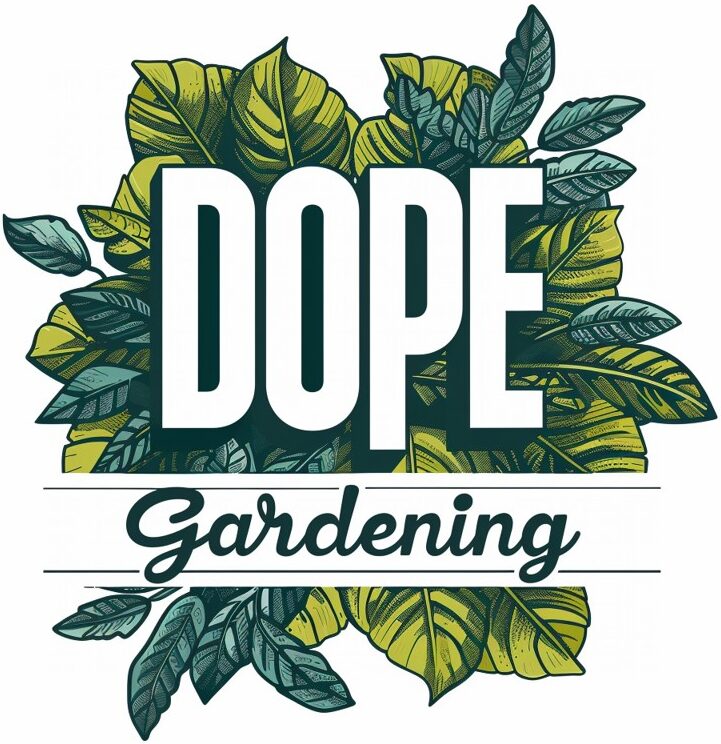Herb Garden Ideas for Small Spaces: Creative Tips for Cozy Corners
Creating a herb garden in a small space can be both fun and rewarding. Whether you have a tiny balcony, a small backyard, or even just a windowsill, you can grow fresh herbs that add flavor to your meals and beauty to your home. Discover the best herb garden ideas for utilizing limited spaces and ensuring you have fresh herbs at your fingertips.
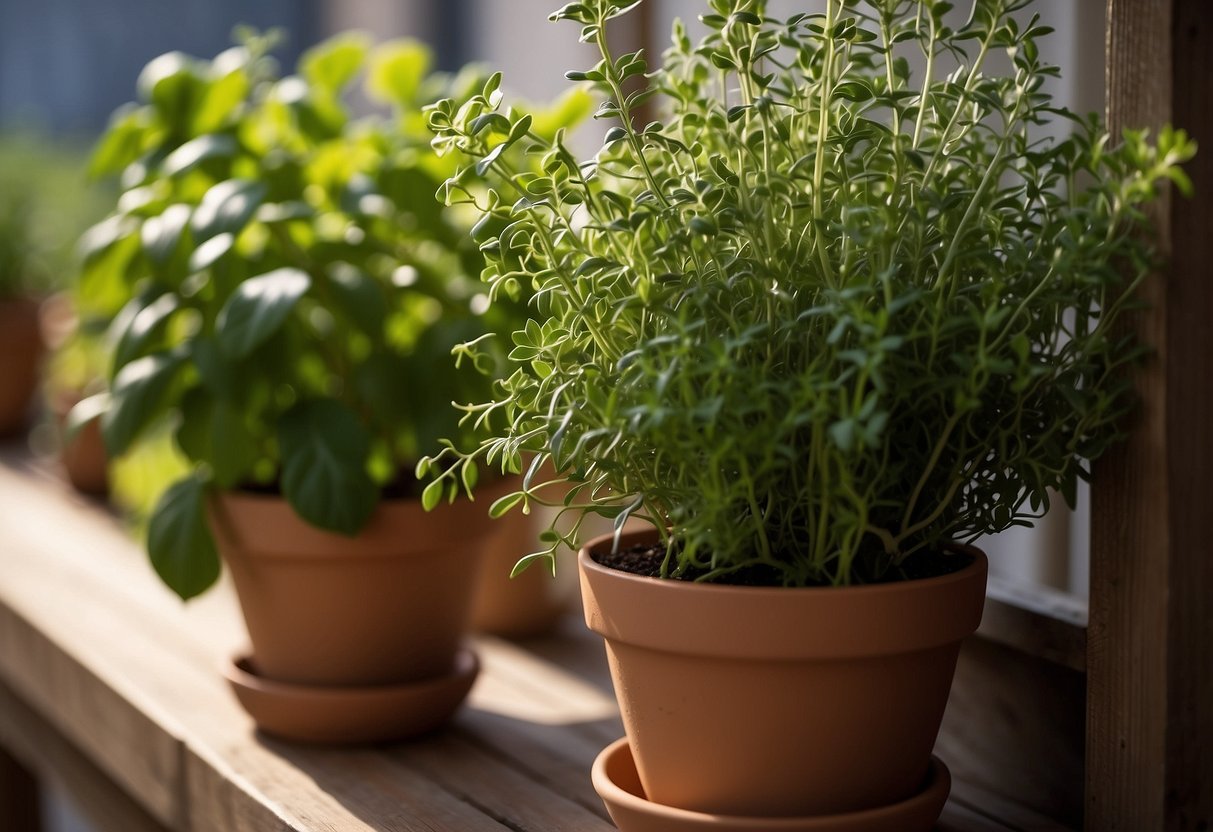
You don’t need a large garden to enjoy growing your favorite herbs. Simple and effective solutions can transform even the smallest areas into thriving herb gardens. From vertical gardening to creative container ideas, you’ll find plenty of inspiration to fit your space and style.
1) Vertical Herb Garden

A vertical herb garden is perfect for small spaces. You can mount glass mason jars on a piece of wood to create a stylish and functional garden. Try hanging shelves with terra-cotta pots; they look great and save space.
Use trellises, wall gardens, or tiered planters to make the most of your walls and unused space. You can also find affordable, self-watering planters that are easy to set up and maintain.
2) Windowsill Herb Planters

Windowsill herb planters are perfect for small spaces. Using a shelf or sturdy rods to hang pots can save space and add a nice look to your kitchen or living room.
You can upcycle items like tea tins or soda bottles for an eco-friendly option. Ensure your containers have good drainage to keep the herbs healthy.
3) Hanging Pots

Hanging pots are a fantastic way to save space while growing your favorite herbs. These pots can be hung on walls, balconies, or even kitchen windows.
You can use simple materials like rope, hooks, and sturdy pots. Make sure the pots have drainage holes to keep your herbs healthy.
For a unique touch, consider using colorful or decorative pots. Herbs like basil, mint, and thyme thrive well in hanging pots.
4) Mason Jar Herb Garden

A mason jar herb garden is a great way to grow herbs in a small space. All you need are a few mason jars, potting soil, and herbs of your choice.
Fill each jar with potting soil and plant your favorite herbs like basil, rosemary, or thyme.
Place the jars in a sunny spot, such as a windowsill. The clear jars let you easily see when the soil is dry and needs watering.
For a creative touch, you can hang the jars on a wall using hooks or a wooden board. This saves counter space and adds a charming decor element to your home. Find more ideas at DIY & Crafts.
5) DIY Herb Ladder
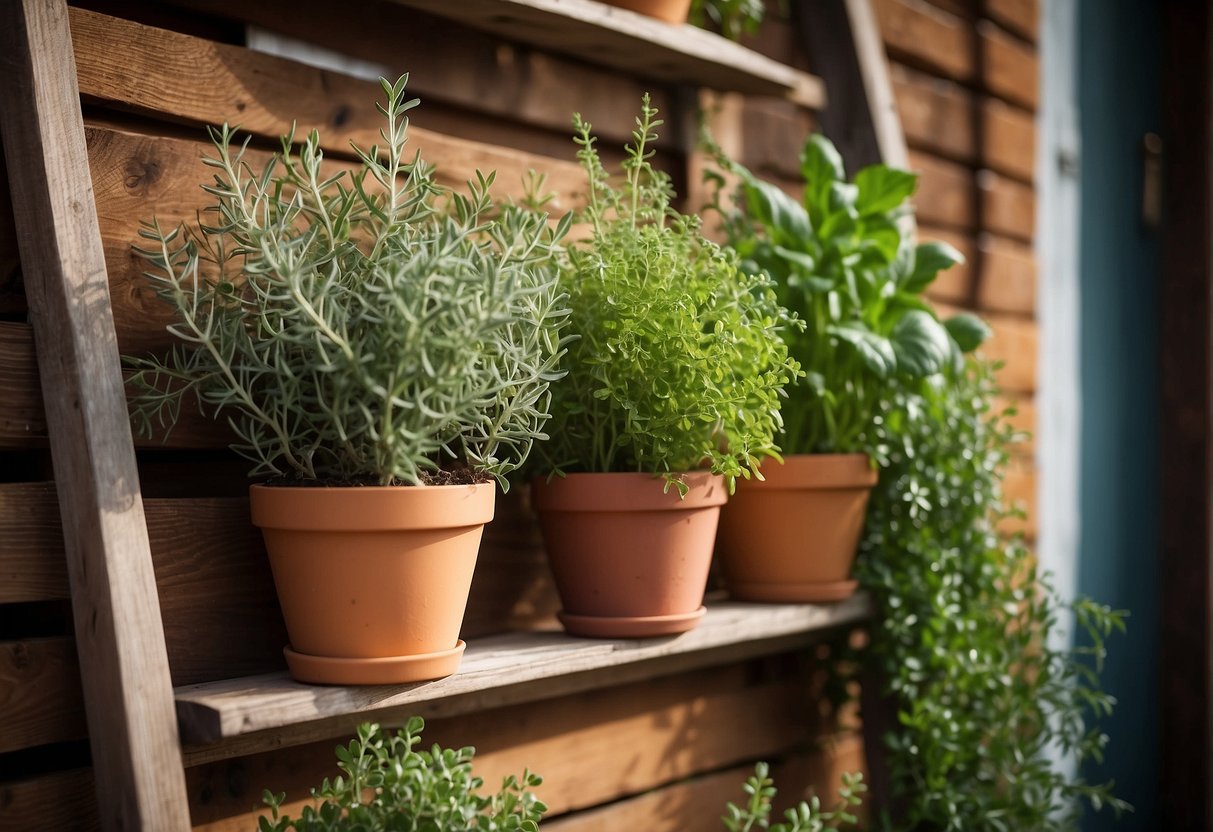
A DIY herb ladder is a great way to save space and grow your herbs. You can use an old wooden ladder or build one yourself.
Paint or stain the ladder to match your decor. Place pots of herbs on each step. You can even attach small pots with hooks or clamps.
Position your ladder near a sunny window or on a balcony. Water the herbs regularly and enjoy fresh, homegrown flavors in your cooking. For more ideas, check out these ladder herb garden ideas.
6) Rail Planter Herb Garden
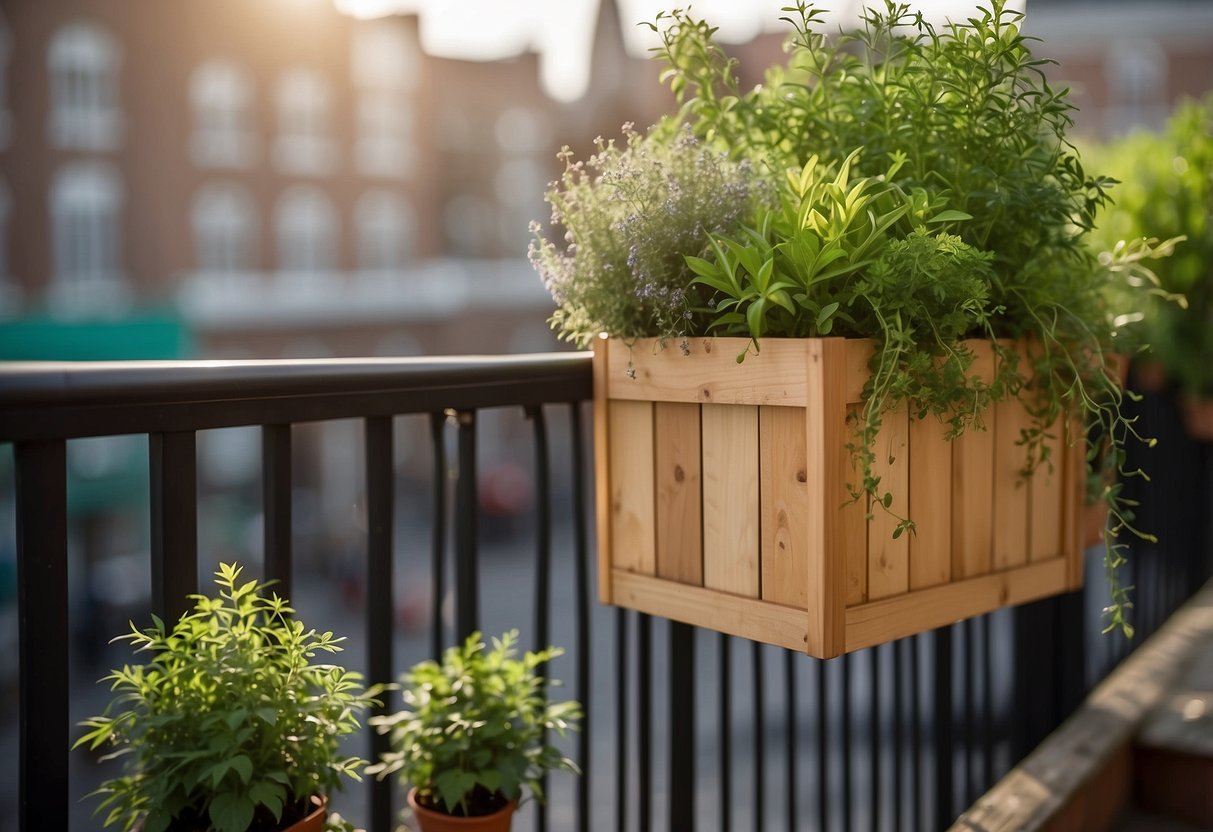
A rail planter herb garden is perfect for small spaces. It’s easy to set up and maintain. Simply hang the planters over your balcony or deck railing.
You can plant herbs like basil, mint, or rosemary. They thrive in these containers and are easy to access while cooking. Plus, it adds green to your space without taking up floor room.
For more tips, check out these herb gardening ideas. Happy gardening!
7) Indoor Wall Planter

An indoor wall planter is perfect for saving space and adding a touch of green to your home. You can use a modern wall planter like the one from Glowpear. It allows you to place herbs directly into the container with soil and mount it on the wall.
This setup is ideal for small apartments or kitchens. It keeps your herbs within reach and creates a beautiful, living display. Choose herbs like basil, thyme, and parsley for a fresh supply right in your kitchen. For more ideas on creating an indoor wall herb garden, you can check out this article.
8) Stackable Planter Tower

A stackable planter tower is perfect for small spaces.
You can grow multiple herbs in just one spot, making it efficient and space-saving.
To set one up, get a stackable garden kit, like this one, which can hold up to 12 different herbs. It’s easy to maintain and looks great on a balcony or patio.
Simply stack the pots, fill them with soil, and plant your favorite herbs.
9) Pallet Herb Garden

A pallet herb garden is a great idea for small spaces. You can easily turn a wooden pallet into a vertical garden.
First, clean and sand the pallet. Then, secure small pots or fabric pockets to the slats.
This way, you can plant various herbs and have a fresh supply for cooking. It’s a fun and easy project for a weekend.
For more ideas, check out these pallet herb garden plans.
10) Recycled Tin Can Herb Garden

Using old tin cans for your herb garden is a fun and eco-friendly idea. You can start by collecting a few empty cans from your kitchen. Clean them thoroughly and make a few holes at the bottom for drainage.
Paint or decorate the cans to match your style. Fill each can with soil and plant your favorite herbs. Place them on a windowsill or hang them near a sunny spot.
This method not only recycles waste but also creates a charming and unique garden. It’s perfect for those with limited space and adds a personal touch to your home.
For more detailed ideas, check out these 17 tin can herb garden ideas.
Choosing the Right Herbs

When choosing herbs for small spaces, it’s important to select varieties that thrive in containers and can be easily managed. You’ll also want herbs that pair well together to maximize your growing area.
Popular Herbs for Small Spaces
Certain herbs are particularly suitable for small spaces. Basil is a favorite; it grows well in containers and adds great flavor to many dishes. Parsley is another versatile herb that doesn’t take up much room. Thyme and rosemary are also excellent choices because they are hardy and don’t require a lot of care. Mint can be grown in containers too, but it’s best to keep it separate since it tends to spread quickly.
Herbs That Grow Well Together
When growing herbs in the same pot or container, it’s best to choose those with similar watering and light needs. For example, basil pairs well with parsley and chives since they all prefer sun and regular watering. Thyme, rosemary, and oregano are great companions because they all need less water and can handle drier conditions. Avoid mixing herbs with vastly different care requirements to ensure they all flourish together.
Optimal Soil and Containers
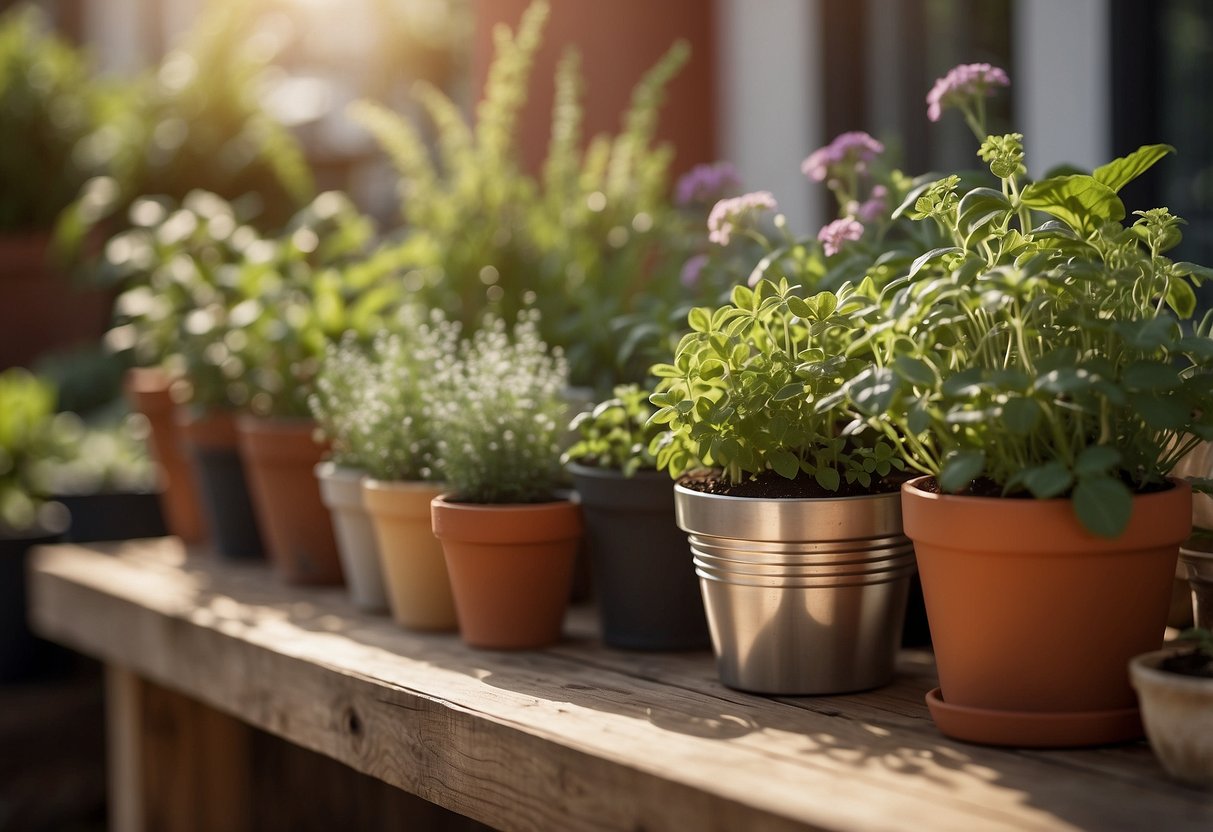
Choosing the right soil and containers is essential for a thriving herb garden in small spaces. Both the soil mix and container type greatly influence your herbs’ health and growth.
Best Soil Mixes for Herb Gardens
For your herb garden, use well-draining soil to prevent waterlogging and root rot. A potting mix is perfect because it includes materials like peat, perlite, and vermiculite. These materials help keep the soil airy and allow excess water to drain away easily.
Avoid garden soil as it’s too dense and can compact in containers. A good potting mix should have some organic matter, so consider adding compost or aged manure. This will provide your herbs with the necessary nutrients.
Herbs like basil and thyme thrive in slightly alkaline soil, so check the pH and adjust with lime if needed. For moisture-loving herbs like chives and parsley, ensure your mix retains enough water between watering sessions.
Choosing the Right Containers
Select containers that match your herbs’ needs. Containers should have drainage holes to prevent water from accumulating at the bottom. Terra cotta pots are a popular choice because they are porous and allow air circulation, which helps prevent root diseases.
If space is limited, use vertical planters or stackable containers to maximize your gardening area. Consider self-watering pots for herbs like cilantro that require consistent moisture.
Size matters too—make sure the container is deep enough to accommodate the herb’s root system. For instance, mint and rosemary need deeper pots, around 10-12 inches, to grow well.
Using the right containers not only helps your herbs thrive but also makes your small space garden efficient and visually appealing.
Light and Watering Requirements

Your herb garden needs the right light and water to thrive, especially in small spaces. Each herb has its own unique needs, but general guidelines can help ensure healthy growth.
Ensuring Adequate Light
Most herbs require about 6-8 hours of sunlight a day. If you have limited sunlight, consider herbs like mint, parsley, and chives which tolerate partial shade. South or west-facing windows generally get the most light.
For indoor gardens, using grow lights can be a great solution. LED grow lights are energy-efficient and can provide the full spectrum of light that herbs need. Position the light about 6-12 inches above the plants and keep it on for 12-16 hours a day.
Rotate your pots every few days to ensure all sides of the plant get light. This helps the plant grow evenly and prevents them from leaning towards the light source.
Proper Watering Techniques
Watering your herb garden correctly is crucial. Herbs typically prefer well-drained soil that isn’t too wet. Overwatering can lead to root rot, which is a common problem in small containers. Feel the soil with your fingers; if the top inch is dry, it’s time to water.
Use a watering can with a fine spout to avoid washing away soil. For herbs in individual pots, make sure they have drainage holes to prevent water from pooling.
Self-watering pots are a fantastic option if you worry about over or under watering. They maintain consistent moisture without you having to check constantly. For example, a piece of PVC pipe can help distribute water evenly in larger planters.
Avoid watering the leaves directly, as moist leaves can promote mildew. Instead, water the base of the plant gently.
